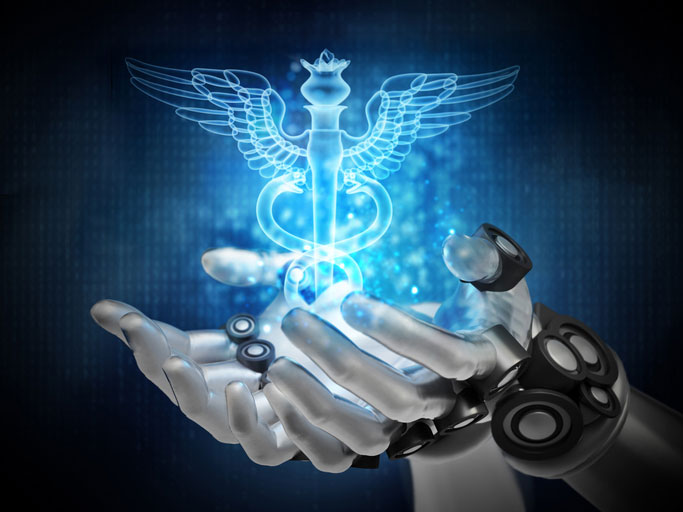Written by Scott Wilson

The future of artificial intelligence in medicine and healthcare is a bright one. Computer vision AI peering over the shoulder of radiologists will offer a second opinion on diagnoses. Clinicians trying to narrow down a differential diagnosis will turn to it for guidance. AI systems may screen healthcare records, lab tests, and images for multiple, uncorrelated clues about health and wellness that could turn up risks for individuals decades before problems emerge.
And that’s all to say nothing of the amazing new treatment options, from newly discovered drugs to surgical robots, that may come to the healthcare system courtesy of AI.
But first, all those incredible systems must be invented.
The first uses of artificial intelligence in medicine will be in the lab, powering the research and development behind all those other wonders.





What Is Medical Science?
 Medical science is a mash-up of biology, physiology, and pathology that helps healthcare professionals better understand how the body and its systems work. It’s key to developing diagnostic and treatment plans.
Medical science is a mash-up of biology, physiology, and pathology that helps healthcare professionals better understand how the body and its systems work. It’s key to developing diagnostic and treatment plans.
From Alexander Fleming, who created penicillin, to Jonas Salk, who saved billions by developing a vaccine for polio, the heroes of medical science throughout history have become household names.
Following in their footsteps, researchers have continued to take on the biggest challenges of disease and mortality. Using new tools and advances in basic sciences like chemistry and biology, healthcare researchers continue to forge ahead in finding the causes of disease, new treatment modalities, and more effective therapies that can be used by more people.
You can see their success in the overall increase of life expectancy around the world: from 32 years on average for a child born in 1900, to more than 70 years for those born in 2021.
That heroic work continues. How far is a question that will be answered by both man and machine.
How AI Will Completely Transform the Work of Medical Scientists
 In the future, those heroes may come with version numbers. When AlphaFold 7.2 cures cancer, how will they build a statue of it?
In the future, those heroes may come with version numbers. When AlphaFold 7.2 cures cancer, how will they build a statue of it?
Many historical challenges in medical science come from simply understanding what normal is. Humans vary greatly in their vital statistics. It’s not always clear what is driven by disease and what is simply normal for an individual. AI, with the ability to quickly parse and identify key features in vast amounts of data, promises answers to some of those questions.
Experimentation also benefits from a fast and smart lab partner. Running the kind of large-scale tests that validate new treatments or medicines is a tough organizational problem.
Finally, medical science has always been faced with the enormous, interconnected complexities of the human body. Understanding the relationships between all the various systems, how they support one another, or how disease impacts them, has been a long-running challenge.
Head bone connected from the neck bone
Neck bone connected from the shoulder bone
Shoulder bone connects from the backbone~ American traditional song Dem Bones, James Weldon Johnson and J. Rosamond Johnson
But artificial intelligence excels at identifying underlying connections that elude human researchers. Scientists using AI have been able to combine weak signals from electrocardiograms and vectorcardiograms to detect myocardial ischemia. AI is being used to listen in on the acoustic signatures of heart valves in operation and detect potentially fatal anomalies.
On top of studying large populations, AI can also assist with longitudinal studies in individuals. With the ability to screen large amounts of structured and unstructured information, it can develop insights from decades of lab tests, patient history, and medical imaging to draw conclusions about general health or disease progression.
Jobs in Medical Science AI Lean Toward the Research Side of the Field
 There’s not a lot of clarity in the healthcare community between jobs for AI professionals in medical science versus other healthcare uses. In part, that’s because most AI use in the field right now is still very much in the experimental phase. The science is still being worked out on everything from radiological interpretation to machine learning-driven diagnostics.
There’s not a lot of clarity in the healthcare community between jobs for AI professionals in medical science versus other healthcare uses. In part, that’s because most AI use in the field right now is still very much in the experimental phase. The science is still being worked out on everything from radiological interpretation to machine learning-driven diagnostics.
Most medical science and research positions will be in organizations that are devoted to long-term scientific investigation, however. So AI engineers looking to specialize in medical science will find their roles in places like:
- Major university medical departments
- Teaching and research hospitals
- Medical device manufacturers
- Nonprofit research institutions
Scientists and medical researchers work closely with AI researchers and engineers to develop new systems to support their work. AI architects are needed to help work out the complex interactions and connections such systems require. And AI project managers work to keep everything on track as they are developed and rolled out.
These are all very specialized positions, and the nature of the community is such that projects come and go. While your employer may remain the same, it’s likely that anyone working on AI in medical science will shift between different projects and tasks throughout their career.
Degrees for AI Professionals Going into Medical Science
 Many advanced degrees in AI come with specializations or concentrations that can help you zero in on medical science applications and careers.
Many advanced degrees in AI come with specializations or concentrations that can help you zero in on medical science applications and careers.
Most of them, however, are far more specific than just healthcare or medicine. Instead, you’ll look for specializations in various subsets of medicine, like biomedicine or bioinformatics.
A Master of Science in Applied Artificial Intelligence Concentration in Bioengineering is a good bet, as are programs like a Master of Science in Artificial Intelligence Health Outcomes concentration. Taking capabilities up a notch are degrees like a PhD in Computational Precision Health, which puts students in the driver’s search researching new capabilities in big data analytics with machine learning.
There are also less conventional options that may work toward even more groundbreaking advances in medical science. A Master of Science in Intelligent Systems Engineering Cyber-Physical Systems track, or Master of Engineering in AI Robotics emphasis can put you on the right track to scientific breakthroughs in prosthetics or even AI-powered implants.
If you’re already in the workforce with a suitable degree in statistics, math, computer science, or other AI-adjacent field, then a full master’s degree may not be what you need. Instead, a program like an AI in Medicine Certificate can build on your current skillset with industry-specific knowledge and training.
You can find certificates in all fields, usually specific to a subset of medical science studies. A Certificate in Human Factors in Medical Devices and Systems can help you brush up on best practices in devices where AI may be integrated.
These programs often take only a few months and involve only a handful of classes. That makes them a lot faster to complete and much less expensive than a full degree. But you need to show up prepared on day one with the right background and foundational skills to get the most out of them.
Professional Certifications Are Big in Both Medicine and Technology
 Healthcare and technology both thrive on professional certifications. As a doctor, nurse, or medical specialist, you aren’t even allowed to practice without a current board certification in your specialty area. While the tech world isn’t that stringent, it’s a rare job advertisement that doesn’t list off desirable or required industry certs candidates must possess.
Healthcare and technology both thrive on professional certifications. As a doctor, nurse, or medical specialist, you aren’t even allowed to practice without a current board certification in your specialty area. While the tech world isn’t that stringent, it’s a rare job advertisement that doesn’t list off desirable or required industry certs candidates must possess.
Professional certification is so valued because it offers an independent assessment and verification of critical skills. Offered by vendors or industry organizations, it may involve some specialized training courses. But the real value is the testing and experience validation that shows you know what you’re talking about.
The list of AI professional certifications is still a little short, but you are likely to find some that apply to various aspects of AI in medical science. For example, the Google Professional Machine Learning Engineer Certification may be a good fit for anyone working with AlphaFold on the company’s Vertex AI platform.
The possibilities seem just about endless for AI in medical science. It’s going to be both an important path to push artificial intelligence to new capabilities, and one of the most worthwhile fields to show the value of those abilities in the most real terms: better health and longer lifespans for everyone.






